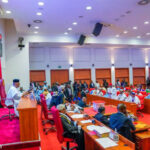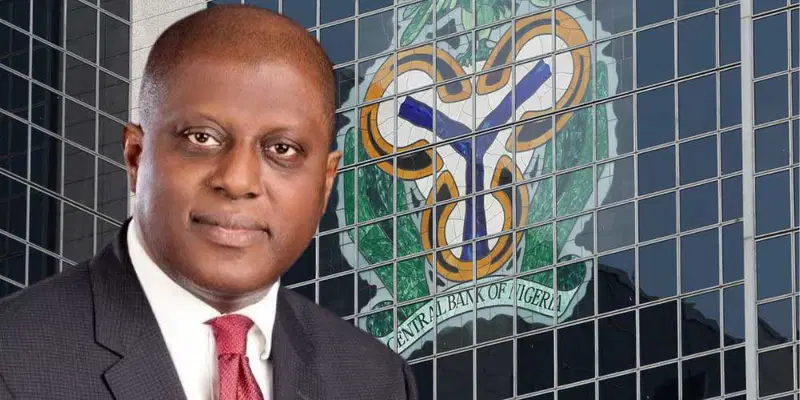Olayemi Cardoso, governor of the Central Bank of Nigeria (CBN), says the country’s foreign reserves rose by 12.74 percent to $39.12 billion as of October 11.
Cardoso spoke on Tuesday when he appeared before the house of representatives committee on banking regulation.
The CBN governor said the country’s reserves stood at $34.70 billion at the end of June.
Data from the apex bank had showed that foreign reserves fell to $32.29 billion on April 15 — the lowest level in over six years.
Advertisement
Cardoso said the nation’s foreign exchange reserves have “grown significantly” with remittance flows currently representing 9.4 percent of total external reserves.
“The reserves rose by 12.74% to $39.12 billion as of October 11, 2024, from $34.70 billion at the end of June 2024,” he said.
The CBN governor said the foreign reserves are driven largely by foreign capital inflows, receipts from crude oil-related taxes and third-party.
“In Q2 2024, we maintained a current account surplus and saw remarkable improvements in our trade balance,” he said.
“The current external reserves position can finance over 12 months of import of goods and services or 15 months of goods only.
“This is substantially higher than the prescribed international benchmark of 30 months, reflecting a robust buffer against external shocks.
“Regarding the foreign exchange market, the bank implemented various reforms including a unification strategy, which streamlined various exchange rate windows into a single model, adopting the willing buyer, willing Seller’ approach to enhance FX liquidity and financial market stability.
“This move was aimed at fostering transparency, reducing market distortions, and enhancing the efficiency of foreign exchange allocations.
“This consolidation involved the implementation of new operational guidelines which included removing the international money transfer operators (IMTOs) quote cap.
“Additionally, the bank resumed the sales of FX at the NAFEM and Bureau De Change (BDC) segments, bolstered by an improved supply from foreign portfolio investors (FPIs).
“In the foreign exchange market, we have achieved increased transparency and improved overall supply. By allowing the foreign exchange rate to be determined by market demand and supply, the CBN has reduced arbitrage and speculative activities and eliminated the front-loading of FX demand.
“These policy measures have effectively narrowed the exchange rate disparities between the NAFEM and BDC segments which have largely led to the convergence of FX rates.
“Improved transparency in the market has restored market confidence leading to increased capital inflows which enabled the CBN to clear existing FX backlogs.
“The settlement of all legitimate backlogs of outstanding FX obligations by the bank has significantly improved Nigeria’s credibility and ratings across the global financial market, helping to boost investor confidence, and enhanced liquidity in the foreign exchange market.
“With improved investor confidence, foreign investments have increased as evidenced by a significant rise in capital importation by 65.56% to $6.49 billion between January and July 2024, compared to $3.92 billion in the corresponding period of 2023.
“Collectively, these actions have contributed significantly to the stability of the financial system.”
‘INFLATION REMAINS A CONCERN’
Cardoso admitted that inflation remains a pressing concern, but said there are reasons for an optimistic outlook.
The latest data by the National Bureau of Statistics (NBS) indicate that the consumer price index (CPI), which measures the rate of change in prices of goods and services, rose to 32.7 percent in September.
The increase was the first in three months after the country’s inflation rate declined twice in July and August.
Cardoso said inflation has shown “gradual moderation,” indicating that the monetary policy measures are “becoming effective”.
“We anticipate steady moderation of inflationary pressures in the last quarter of 2024, supported by our monetary policy measures and the federal government’s recent initiatives such as tax incentives on businesses in the economy,” he said.
“To combat inflation, we have fully reverted to an orthodox monetary policy approach and implemented a comprehensive set of monetary policy measures.
“These include raising the policy rate by 850 basis points to 27.25%, increasing cash reserve ratios and normalising open market operations as our primary liquidity management tool.
“In addition, we have adopted an inflation-targeting (IT) monetary policy framework as part of the bank’s enterprise strategy (2024-2028).
“The IT framework, widely adopted across various global economies, is renowned for its effectiveness in combating persistent inflation.”
The CBN govenor said these measures are aimed at stabilising prices, optimising liquidity management, and engendering an effective monetary policy framework.
Don’t Miss The Opportunity Awaiting You. Click the link below 👇
https://faikudoka.net/4/5193489
Please don’t forget to “Allow the notification” so you will be the first to get our gist when we publish it.
Drop your comment in the section below, and don’t forget to share the post.
Never Miss A Single News Or Gists, Kindly Join Us On WhatsApp Channel:
https://whatsapp.com/channel/0029Vad8g81Eawdsio6INn3B
Telegram Channel:
https://t.me/gistsmateNG















